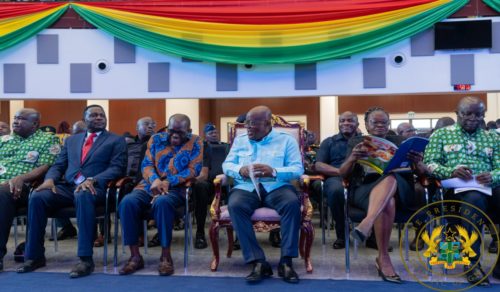The entire transformation program being undertaken by the National Service Scheme, which is linked to the new strategic direction of other pro-youth organizations, is addressing the particular job demands of young people, according to President of the Republic Nana Addo Dankwa Akufo-Addo.
According to him, the main goals of this youth-driven reform agenda include training and skill development, the provision of pre-employment support activities, and imparting values like civic responsibility, self-control, nationalism, and voluntarism.
To this end, the President stated that “several youth development programmes have been put in place, which not only prioritise young adults’ needs and build the skills needed to become productive and successful members of society, but also strengthen young people’s sense of identity and belief in the future.”
This information was provided to President Akufo-Addo on Tuesday, October 10, 2023, at the beginning of events honoring the National Service Scheme’s Golden Jubilee Anniversary at the Auditorium of the University of Professional Studies in Accra.

Citing the Ghana Enterprises Agency’s (GEA) YouStart Program, the National Entrepreneurship and Innovation Programme (NEIP), and the Commission for Technical and Vocational Educational and Training (CTVET), he added, “my government, since 2017 has engaged young people, including National Service Personnel, in intentional, productive and constructive ways, whilst recognising and enhancing their strengths.”
For instance, President Akufo-Addo mentioned that under the Economic Enclave Programme, the NSS will deploy 65,000 graduate youth to the Agricultural Enclaves over the course of the next four years, create 81,000 jobs in the agricultural and related sectors, and develop 20,000 hectares of land for production in addition to producing 110,000 metric tons of food and 1.5 million birds.
By year four, he predicted, this will generate revenue of about US$92 million.
In addition, President Akufo-Addo informed the crowd that, for the first time in its history, the NSS will submit a draft policy document to Parliament, converting the Scheme into an Authority and creating a legal framework for the proposed “Deployment for Employment” (D4E) model, which is designed to encourage recently graduated students to make a positive impact and advance our country.
The President asked the Program to expand and address the need for NSS support for the health and education sectors, as well as Graduate/Youth in Agriculture, as a way to reduce reliance on imports and address issues with food security “focus on the new modules that it has initiated, with the purposive intention that the capabilities of these energetic and educated youth would be deployed to generate maximum impact for the socio-economic development goals of the country.”
The President, in his address, paid glowing “homage to the Members of Parliament who deliberated on the draft NSS Bill that culminated in the passage of Act 426. They include the late statesmen, J. H. Mensah, A. A. Munufie, Peter Ala Adjetey, Harry Sawyerr, and Kwaku Baah, among others.”
“I recount the words of the then Member of Parliament for Atwima Nwabiagya, Hon. John Agyekum Kufuor, subsequently the 2nd President of the 4th Republic, who intimated, during the debate on the processes leading to the passage of Act 426 in 1980, that the “Scheme is a vehicle for building national cohesion”. He again posited that “we should look at the Scheme as a development of human resources. We are going to make our future manpower more prepared to be used more efficiently”, he told the gathering.
Source: Ghanatodayonline.com
 Ghanatodayonline.com News, Politics, Health, Education & More
Ghanatodayonline.com News, Politics, Health, Education & More



